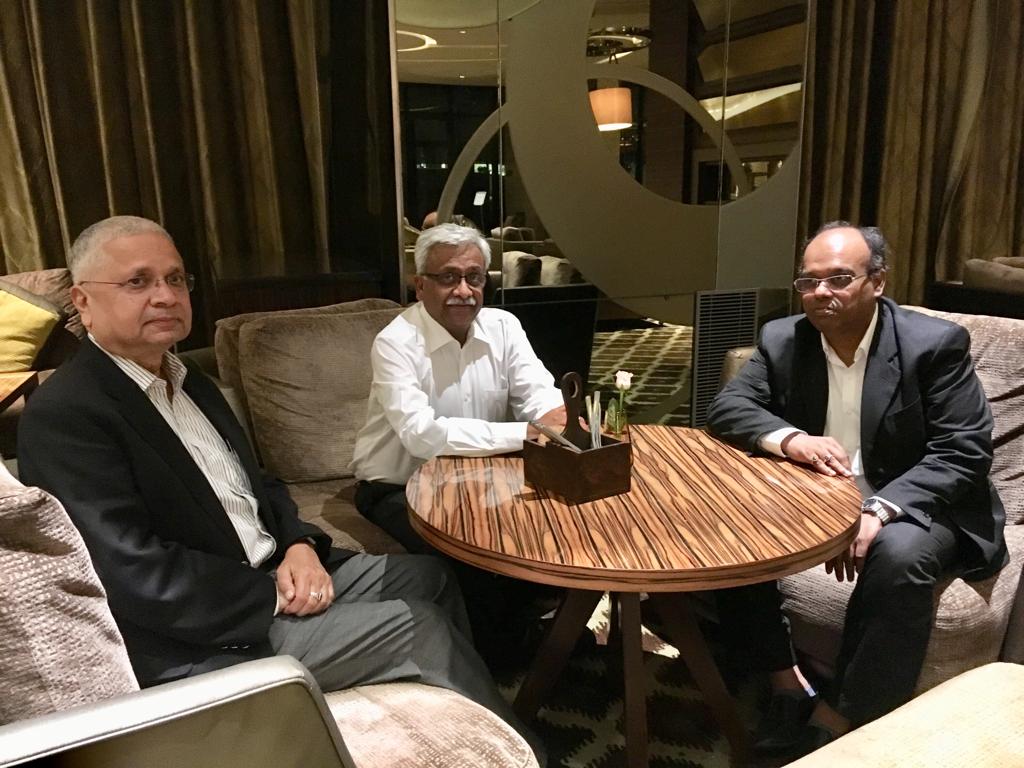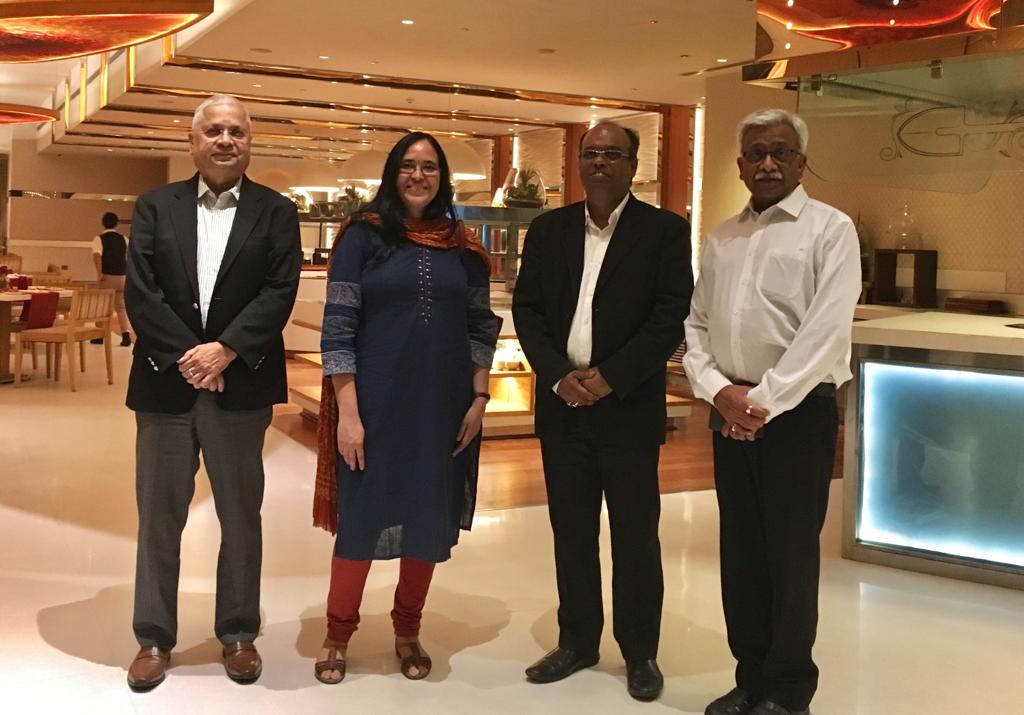ASDC has taken many initiatives to embrace digital technology to consolidate, standardize and scale skilling in the automotive industry. As a trailblazing Sector Skill Council (SSC) in striving for quality and standards to improve the productivity of the workforce, ASDC is all set to match potential candidates with right jobs and enable smooth functioning of the ecosystem.
On the occasion of the Annual Conclave we caught up with the leadership team to understand the interventions in bringing speed and scale to skilling by making it inclusive and outcome-based. Facilitated by Madhuri Dubey, Founder-NSN, the Skill Talk is a pre-event discussion with Mr. Nikunj Sanghi, Chairman, ASDC; Mr. Raman Kumar Sharma, Advisor, ASDC and Mr. Arindam Lahiri, CEO, ASDC. Below are excerpts from the conversation that touched upon many issues pertaining to present and future jobs and skills.
Madhuri: Could you please share the ASDC journey so far and tell us more about the decision to adopt a digital strategy to empower the stakeholders
Mr. Nikunj Sanghi: ASDC is the first Sector Skill Council to take off after the skilling mission was started and it was backed by in-depth research about the industry requirements. The Qualification Packs (QPs) and National Occupational Standards (NOS) for different job roles was created after an intense discussion with the industry members. Though we are able to accomplish systematic documentation, we realized that there was no ecosystem. So our biggest challenge was to identify the training partners and assessment partners and to bring them on board and train them for effective delivery. In a short period we were able to certify almost 3.5 lakh candidates as industry-ready.
Scaling up assessments with trust and transparency
However, when we realized that post training the candidates are not able to get employed, we decided to understand the skill gaps and improve the assessment system to bring credibility to certification. Based on research on digitally-enabled assessing solutions, we selected TCS to partner us in bringing trust and transparency to our endeavours through technology. Their experience in enabling assessment and their technology infrastructure, standards and professionalism set them apart. The assessment will be conducted in TCS-enabled sanitized centers just like in other institutions of higher learning. Their centers are spread across the country. The pilot projects conducted during the last 3 months in different parts of the country have been successful.
Skill Gap Study Report
There has been a concern among the industry members that the certified candidates don’t meet their skill requirements as there have been many technology disruptions. This needed a study of skill gaps across the sub-sectors like component manufacturers, the vehicle manufacturers, and the sales and service. We engaged Ernst and Young to conduct the study and the report will be released in the conclave.
With these two partners on board, we embarked on the next phase of our journey to skill the right people for the right jobs and the right geographies. Enabling digital assessments without any manual intervention was the key differentiator.
This digital platform will also enable all employers to get on board across different locations and list their present and future jobs. Our training partners will know in which geography what are the jobs that are available so that they can ensure better placements. Students would know, which courses they should take because those are the jobs which will be available. This would be a robust solution bringing all the stakeholders on one single platform meeting the industry demand with present and future skills. Moreover, our training partners and assessment partners would be digitally accredited through this system.

Mr Raman Kumar Sharma: For the automotive sector, this is the first-of-its-kind portal that can bring a lot of transparency of processes and access to authentic data and verfication. It will bring new identity to the candidates certified by ASDC as being the right talent for the right job role, in terms of qualifications and productivity standards.
Mr. Nikunj Sanghi: Through the digital platform we are also addressing another important need of enabling learning anytime, anywhere through a digital learning hub. A person in remote corner of Rajasthan should be able to access content on a particular skill and learn at his or her convenience. The digital learning app would facilitate this in a big way. The focus on going digital is also in line with the government’s push for digitally-enabled solutions that promote transparency and improve accessibility.
Mr. Arindam Lahiri: Demand-driven skilling has been the focus for every industry. At ASDC, we’ve conceptualized the digital platform in such a way that it provides all the information together, at one place. So the listing feature of the TCS platform is designed to solve issues related to inconsistency of information. For example, the availability of jobs in a sub-sector, what is the prediction for upcoming job roles and what are the skills in demand. It will provide links to all our partners wherein they can share their projections and find the right candidates.
Madhuri: How do you plan to implement the Digital Platform and what is the vision for Automotive Skill Hub?
Mr Raman Kumar Sharma: We’ve started with the assessment process. We have started with the work of digital learning process, the first version is already being developed and we already work with various job roles and certified candidates database is getting built up. Now over the next 12 to 18 months, it will gain momentum, become scalable and sustainable.
Mr Nikunj Sanghi: We need to win the confidence of our stakeholders. We’re taking baby steps; industry participation will determine the success of the platform. For instance, if a dealer is convinced about the benefits of using the platform, it will gradually bring more dealers. Similarly with component manufacturers even automotive manufacturers. So, each of them needs to be tested to see to see the results.
Mr. Arindam Lahiri: The PoC is already executed and over the last 6 months we have already assessed more than a thousand candidates using this methodology. Now we need to scale up and we plan to include more features like access to digital learning content, co-creation of content by the industry. Though some basic content is available we would invite our stakeholders to populate the system with relevant content for easy access to learning.
Madhuri: How is ASDC preparing to equip the stakeholders with skilling for Electric Vehicles (EV)?
Nikunj Sanghi: Since EV technology is still evolving, even in the most developed countries, we are seeking global partners to facilitate knowledge sharing. We’re seeking international collaboration to understand the implications on skilling along with formulating the training curriculum. By partnering with some progressive countries, we will explore practical solutions that will equip training in the EV sector. Also, in our Governing Council, we have included a member from the EV industry.
Arindam Lahiri: To get started, we need to prepare an occupational map in different kinds of functions, and new job roles in the EV segment. We have divided the job roles into categories like skills that will get outdated, jobs that need reskilling and absolutely new job roles. This is based on the impact of technologies in transforming the nature of work. The job roles under EV are ratified by the industry currently associated with this sector. We are also collaborating with Automotive Research Association of India (ARAI) for a comprehensive outlook.
Raman Kumar: ARAI is very keenly engaged with Indian industry in terms of creating standards for EVs, so we have taken their help in understanding the prospective learning needs and skills and in turn seek their validation. This is more at R&D stage now and soon we will be signing an MoU with ARAI in this regard.
Madhuri: Please share your views on apprenticeships and RPL 4 in the Automotive Industry
Mr. Nikunj Sanghi: There have been many modifications to the apprenticeship programs and these are rightly intended in making it inclusive. We are happy with the government making these phenomenal improvements and we hope the industry members engage more apprentices. For the automotive sector ASDC is the delivery partner for apprenticeships. We also see a lot of enthusiasm from Component Manufacturers and Dealers to explore apprenticeship as an option to get skilled workforce.
Mr. Arindam Lahiri: With regard to RPL 4, we have piloted it in few companies and some certificates will be distributed in the conclave. You will see candidates from dealers, component manufacturer, cab aggregators (Ola). We undertaken a project with them and hopefully, we will extend it to Uber as well so that we cover a large number of drivers.














Comments 1